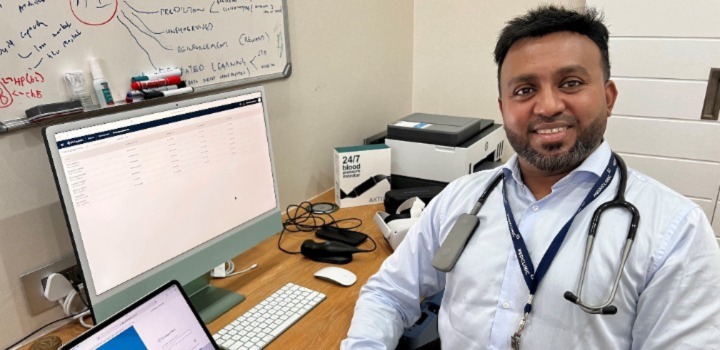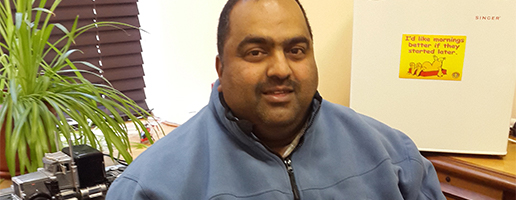Dr Govender uses "brilliant" Hospital at Home to treat patients

As an early adopter of the Discovery Hospital at Home programme, Dr Sudeshan Govender reports back on the significant benefits for his patients - including access to cutting-edge remote monitoring technologies and top healthcare teams, and more.
"Discovery Hospital at Home is an excellent product and it's here to stay," says Dr Sudeshan Govender, a family medicine specialist physician working in cardiometabolic diseases. Dr Govender is also a director at Mediclinic Victoria Hospital in Tongaat, KwaZulu-Natal, where he is based.
"The Fourth Industrial Revolution has meant a rise in connectivity and computing power, which has led to improved point-of-care digital tools. We must use these advances to better manage and treat our patients. Hospital at Home benefits everyone involved - the patient, their family, the doctor, the funder, and even the hospital that patients who were treated at home avoided being admitted to," says Dr Govender.
Discovery Hospital at Home was launched at the start of 2022 following significant collaboration with leading global partners.
Hospital at Home is the product of merging traditional multidisciplinary hospitalisation with cutting-edge, remote-monitoring medical technology. The artificial intelligence in the monitoring systems helps predict the patient's disease trajectory and allows early detection of issues. This empowers the clinical team to intervene early and accurately track the patient's status and progress.
The programme is one of the first of its sort available in South Africa and provides care in the patient's own home (if the treating physician is comfortable with care at home) for a range of medical and post-surgical conditions that would otherwise require hospital admission.
Globally, leading medical facilities are running hospital-at-home care with exceptional results. The offering has been studied through randomised controlled trials and other published research, and consistently demonstrates high safety with superior outcomes at lower cost.
- Read a recent LinkedIn post by Dr Ryan Noach explaining this programme.
Hospital at Home admissions are quick and easy
Dr Govender uses the Discovery HealthID patient electronic health record to admit patients to Hospital at Home quickly and easily. "I've never had any problems with admission. In fact, it's easier to admit patients to Hospital at Home than to a normal hospital," he says.
"We fill out and submit forms on the platform. We very quickly get a call from one of the case managers from Discovery Health Medical Scheme to start the process. The system is streamlined and the platform is user-friendly."
"I have had seven patients that have been successfully managed with Hospital at Home since the programme launched in January 2022."
Patient criteria for Hospital at Home
Patients must meet certain criteria to be admitted to Hospital at Home. "The patients I admit are those that would usually go into a general ward. They need an IV or auxiliary management like wound care specialists or physiotherapists," explains Dr Govender.
"Some of the conditions that I've treated using Hospital at Home include uncomplicated bronchial pneumonia, stable heart failure, deep vein thrombosis, and cellulitis of the legs."
"In Durban, where I am based, we often see patients with urinary tract infections that are resistant to out-of-hospital management. These patients are usually admitted to hospital and spend around seven days on an IV antibiotic. However, they are the type of patient who is perfect for admission to Hospital at Home."
- Read more about the Hospital at Home admission criteria.
"Thank you, that was such a dignified admission."
"I've had rave reviews from the patients I've admitted to Hospital at Home, especially the elderly."
"A 73-year-old patient we admitted said it meant the world to her to recuperate in familiar surroundings, surrounded by her relatives. She was managed very well by the excellent Hospital at Home team, which included highly trained, dexterous nurses. A physiotherapist treated her at her home and a lab went out and did bloods for her."
"The first thing this patient said to me once she'd recovered was: 'Thank you - that was such a dignified admission.' In her previous admissions to a normal hospital, she became so agitated and delirious that she was sedated and restrained. You never want to see an elderly patient in that condition. It's not good for the patient or for the family."
Cutting-edge technology and round-the-clock medical monitoring
- Patients admitted to the Hospital at Home programme have access to an app which is linked to the remote-monitoring Biofourmis device. Biofourmis is a global leader in digital monitoring solutions. This ground-breaking device is worn on the patient's arm and continuously monitors 22 physiological signals, sharing these in real-time not only with the patient, but also with the care team, the patient's physician and the 24/7 control centre.
- Artificial intelligence algorithms are applied to the readings and give an additional predictive view of a patient's disease trajectory. This is key to detecting issues, intervening early, and preventing potential medical crises.
- This information is sent to a hospital-based care team, 24 hours a day, 7 days a week.
"The Biofourmis device sends me data in real time, so that I am alerted to the patient's blood pressure, pulse, and heart rate and rhythm," explains Dr Govender. "Some point-of-care devices that are used in Hospital at Home even send out an ECG for me, so I can pick up if a patient is having an arrythmia or abnormal heart rate and I can detect an ischemic event early on."
"The question that some doctors ask me is: 'With all this data coming through to you, won't it cause physician burnout?' This hasn't been a problem because the Biofourmis device has a data analytics system, so it only alerts me to abnormalities. There's also a full panel of emergency medicine-trained doctors that monitor the system all the time. They pick up on the alerts and, if necessary, they will get in touch with the patient, their relatives, or the care team who are at the patient's bedside. And they will escalate the alert to the patient's physician too."
Better patient experience and clinical outcomes, with cost reduction
"Apart from better patient experience, we've also experienced better clinical outcomes with Hospital at Home - with patients spending less time admitted than they would in hospital. They tend to mobilise much faster because they're at home, and they have fewer secondary complications like hospital-acquired infections."
Dr Govender is an enthusiastic adopter of technological advancements in the medical field and has collaborated with Harvard Medical School, Harvard Business School, Harvard TH Chan School of Public Health, Henley Business School and the University of South Wales to find novel and innovative strategies for treating his patients.
"The improved patient experience and clinical outcomes, along with a reduction in costs, has been echoed globally by hospitals such as Brigham and Women's Hospital (Harvard Medical School's second largest teaching hospital in Boston) and The Mount Sinai Hospital in New York City," he says.
- Earlier this year, Discovery Health's Hospital at Home programme was awarded first place in the 'Product & Service Innovation' category at the 2022 Efma-Accenture Innovation in Insurance Awards.
Many fail-safes protect doctors and their patients
"There's still a lot of trepidation when you talk about Hospital at Home, from a corporate as well as a medicolegal perspective," says Dr Govender. "I totally understand this, because until I first used Hospital at Home, I felt the same."
"Some physicians are hesitant to use Hospital at Home because of the medicolegal aspect surrounding it. But there are so many fail-safes built into the system to protect us."
"Firstly, the patient's admission to Hospital at Home is physician-driven and not funder- or patient-driven."
"Secondly, if a patient deteriorates while admitted to Hospital at Home, the cutting-edge predictive analytics available through the programme will detect that immediately. You can arrange for them to be transported to a traditional hospital to continue their treatment."
"Thirdly, during my regular virtual consultations, I receive information about the patient's condition from the patient themselves, as well as the nurses around them."
"I receive real-time objective data from the Biofourmis device. I am also confident that the medical team monitoring alerts from the Biofourmis device will contact me in case of emergency."
"Altogether, my experience of the programme is that it allows me to make an informed decision on the patient's health, which decreases the litigation risk."
"Doctors will also want to know how their payment is affected when admitting patients to Hospital at Home. The answer is that it doesn't affect payment. You can still bill for consultations and for monitoring the patient - even though all of that is done virtually."
Hospital at Home extends the reach of normal hospitals
"As a director of a hospital, it's natural to think that Hospital at Home is going to attack our business. But that's not true, because Hospital at Home actually expands the boundaries of the hospital's normal brick-and-mortar confines, to the patient's home. Effectively, it adds to our bed numbers and capacity without the associated infrastructure costs."
Dr Govender recalls having to admit a patient with stable heart failure to Hospital at Home when the hospital didn't have an open bed. "I was still able to manage her properly with the help of highly trained ICU nurses and data analytics from the remote-monitoring Biofourmis device. We were able to monitor her at home and get her through to total remission."
"In addition, by using Hospital at Home, we can free up hospital beds for more complex cases. From a corporate point of view, that means better costs per bed."
Hospital at Home adds another dimension to patient management
"Hospital at Home won't ever replace traditional hospital admissions as a whole. It offers an alternative way to deal with some admissions and opens another dimension for us in the management of patients. It enhances what we as doctors can do and what we offer to our patients. Also - and this is a passion area of mine - it's another arrow in our quiver for fighting non-communicable and communicable diseases."
"Conveniently, the cost for Hospital at Home is paid for from the patient's in-hospital benefits. This means that even patients on lower plans can use and benefit from Hospital at Home when they require hospital level care."
Hospital at Home also makes it possible to provide health literacy to vulnerable patients
"Hospital at Home also helps to prevent readmissions where patients were hospitalised in the past. And the advantage of having a team treating a patient in their own home is that they can provide health literacy to the patients and their families. The team can see first-hand what social determinants may affect the patient - like whether they have water and electricity and proper support structures in the people who surround them at home. They can also see if those support people are aware of the signs to look out for if their relative's condition is deteriorating, and so on."
"The patient and their relatives are taught these things when they are first admitted to Hospital at Home - empowering them to be more in control of their own healthcare. This is something that doesn't always happen in-hospital because the doctors and nurses have several other patients to care for at the same time."
"I once had a patient's son phone me. He thought his mother was going into heart failure because her blood pressure was rising, and she was having more palpitations than normal. This patient wasn't admitted at the time but, based on her son's information, we were able to arrange remote monitoring and treatment at home for her. This prevented her from going into heart failure and being hospitalised."
"Hospital at Home also limits a patient's exposure to hospital-acquired infections and other in-hospital complications that may arise."
Potential to redefine healthcare
"The Hospital at Home model is an effective tool for advancing the triple aim of healthcare, namely clinical quality, affordability and exceptional patient experience. This gives it the potential to be expanded beyond the bounds of Discovery Health into the uninsured market. We have a large population in South Africa who are uninsured and who don't have access to affordable healthcare. I am of the strong opinion that disruptive innovative models like Hospital at Home will undoubtedly help in achieving that elusive utopian universal healthcare coverage," says Dr Govender.
"I give so much credit to the team at Discovery Health for bringing in this new technology - they are game changers. I think it's brilliant!"
- Discovery Health's Hospital at Home programme won first place in the 'Product & Service Innovation' category at the 2022 Efma Accenture Innovation in Insurance Awards earlier this year.
- Find out more about Hospital at Home
- Admit a patient through Hospital at Home
Related articles

Reona recovers in the comfort of home with Hospital at Home
For Reona Naidoo, the Hospital at Home programme has made getting sick regularly (post a surgery in 2019) more bearable. She now has access to 24/7 treatment and monitoring, giving her peace of mind about her health - and also about avoiding separation from her two children for days on end.

Dr Nazeem Ismail commends Discovery Home Care nurses
Dr Nazeem Ismail, Undersecretary to the National Assembly in Parliament, has been wheelchair-bound for 20 years. He recently started using the Discovery Home Care benefit to treat an infection and says it has made a massive difference in his life.

Discovery Home Care nurse brims with compassion and hope
Discovery Home Care professional nurse Drikie Richardson draws from her personal experience of surviving breast cancer to help her patients, give them hope and inspire them to get better - making her a firm favourite among her patients in Cape Town.